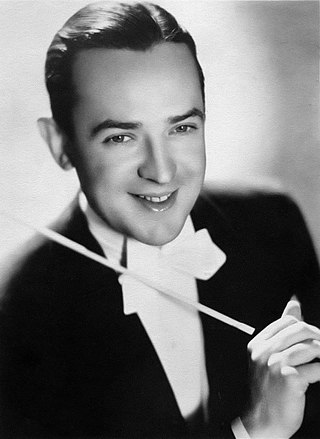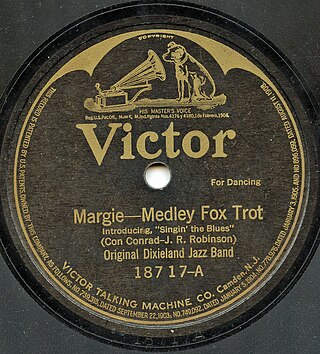Related Research Articles

Polka is a dance style and genre of dance music originating in nineteenth-century Bohemia, now part of the Czech Republic. Though associated with Czech culture, polka is popular throughout Europe and the Americas.

James W. Sturr Jr. is an American polka musician, trumpeter, clarinetist, saxophonist and leader of Jimmy Sturr & His Orchestra. Media outlets have often dubbed him the "King of Polka," with his recordings having won 18 out of the 24 Grammy Awards given for Best Polka Album. Sturr's orchestra is on the Top Ten List of the All-Time Grammy Awards, and has acquired more Grammy nominations than anyone in the history of musical polka awards.

James Francis Dorsey was an American jazz clarinetist, saxophonist, composer and big band leader. He recorded and composed the jazz and pop standards "I'm Glad There Is You " and "It's The Dreamer In Me". His other major recordings were "Tailspin", "John Silver", "So Many Times", "Amapola", "Brazil ", "Pennies from Heaven" with Bing Crosby, Louis Armstrong, and Frances Langford, "Grand Central Getaway", and "So Rare". He played clarinet on the seminal jazz standards "Singin' the Blues" in 1927 and the original 1930 recording of "Georgia on My Mind", which were inducted into the Grammy Hall of Fame.
Wisconsin was settled largely by European immigrants in the late 19th century. This immigration led to the popularization of galops, schottisches, waltzes, and, especially, polkas. Classical composers and conductors from Wisconsin include Hans Balatka, Hugo Kaun, Eugene Luening, and Theodore Steinmetz. Among Wisconsin's contributions to rock music were Les Paul, an electric guitar pioneer known as the "Wizard of Waukesha". The Steve Miller Band, with Milwaukee's Steve Miller, had three #1 hits on the Billboard Hot 100 from 1973 to 1982. The Chordettes from Sheboygan, Bon Iver from Eau Claire, and Garbage from Madison all had albums on the Billboard 200.

Albert Edwin Condon was an American jazz banjoist, guitarist, and bandleader. A leading figure in Chicago jazz, he also played piano and sang. He also owned a self-named night club in New York City.

The Dorsey Brothers were an American studio dance band, led by Tommy and Jimmy Dorsey. They started recording in 1928 for OKeh Records.

Jaromír Weinberger was a Bohemian born Jewish subject of the Austrian Empire, who became a naturalized American composer.
James Brian Pekol is an American musician originally from Wausau, Wisconsin.
The Suite for Jazz Orchestra No. 1 by Dmitri Shostakovich was composed in 1934.
Fess Williams and his Royal Flush Orchestra was the main band of clarinetist Fess Williams from 1926–1930

Polka is a music and dance style that originated in Bohemia in the 1830s and came to American society with immigrants from Europe. A fast style in 2
4 time, and often associated with the pre–World War II era, polka remains a dynamic "niche" music in America.
"There'll Be Some Changes Made" ("Changes") is a popular song by Benton Overstreet (composer) and Billy Higgins (lyricist). Published in 1921, the song has flourished in several genres, particularly jazz. The song has endured for as many years as a jazz standard. According to the online The Jazz Discography, "Changes" had been recorded 404 times as of May 2018. The song and its record debut were revolutionary, in that the songwriters (Overstreet and Higgins, the original copyright publisher, Harry Herbert Pace, the vocalist to first record it, the owners of Black Swan, the opera singer for whom the label was named, and the musicians on the recording led by Fletcher Henderson, were all African American. The production is identified by historians as a notable part of the Harlem Renaissance.
Charles Émile Waldteufel was a French pianist, conductor and composer known for his numerous popular salon pieces.

The Smithsonian Collection of Classic Jazz is a six-LP box set released in 1973 by the Smithsonian Institution. Compiled by jazz critic, scholar, and historian Martin Williams, the album included tracks from over a dozen record labels spanning several decades and genres of American jazz, from ragtime and big band to post-bop and free jazz.

"Elmer's Tune" is a 1941 big band and jazz standard written by Elmer Albrecht, Dick Jurgens and Sammy Gallop. Glenn Miller and his Orchestra and Dick Jurgens and his Orchestra both charted with recordings of the composition.

"Singin' the Blues" is a 1920 jazz composition by J. Russel Robinson, Con Conrad, Sam M. Lewis, and Joe Young. It was recorded by the Original Dixieland Jass Band in 1920 as an instrumental and released as a Victor 78 as part of a medley with "Margie". The song was released with lyrics by vocalist Aileen Stanley in 1920 on Victor. In 1927, Frank Trumbauer, Bix Beiderbecke, and Eddie Lang recorded and released the song as an Okeh 78. The Trumbauer recording is considered a jazz and pop standard, greatly contributing to Frank Trumbauer and Bix Beiderbecke's reputation and influence. It is not related to the 1956 pop song "Singing the Blues" first recorded and released by Marty Robbins in 1956.
Lawrence Duchow was an American bandleader recorded on the RCA Victor label from 1932 to 1954.

Larry Chesky, born Lawrence J. Ciszewski, was an American accordion player, Polka band leader, inductee in the International Polka Hall of Fame, and manager of the Rex Records label.
Charles Le Thière was a British composer, arranger and flautist. He was the son of a goldsmith and jeweller Thomas William Tomkins and his wife Eliza Tomkins, who had a store and company in Clerkenwell.
"My Greatest Mistake" is a popular song written in 1940 by Jack Fulton and Jack "Bones" O'Brien.
References
- ↑ http://images.library.wisc.edu/WI/EFacs/MTWCImages/OccSeries/Monograph28/reference/wi.monograph28.i0001.pdf Robert Janda, "Entertainment Tonight: An Account of Bands in Manitowoc County Since 1900", pg. 6
- 1 2 3 4 5 Don Dornbrook, "Wisconsin's Romy Gosz is the King of the Polka", Milwaukee Journal, April 9, 1945, Green Sheet pg. 1
- ↑ Victor Greene, "A Passion for Polka: Old-Time Ethnic Music in America", 1992, p. 165
- 1 2 Scottie Dayton, "Romy Gosz - The Man with the Golden Trumpet", Wisconsin Newmonth, November/December 1997, pg. 7
- 1 2 Romy Gosz
- 1 2 Eleanor Steinert, "Pride of the Polka Belt", Coronet magazine, November 1945, pg. 100
- ↑ Victor Greene, "A Passion for Polka: Old-Time Ethnic Music in America", 1992, p. 166
- ↑ "King of the Polka," Time magazine, June 25, 1945, p. 45
- ↑ Eleanor Steinert, "Pride of the Polka Belt", Coronet magazine, November 1945, pg. 98
- ↑ http://images.library.wisc.edu/WI/EFacs/MTWCImages/OccSeries/Monograph28/reference/wi.monograph28.i0001.pdf Robert Janda, "Entertainment Tonight: An Account of Bands in Manitowoc County Since 1900", pg. 8
- ↑ Wisconsin Polka Hall Of Fame – Inductees